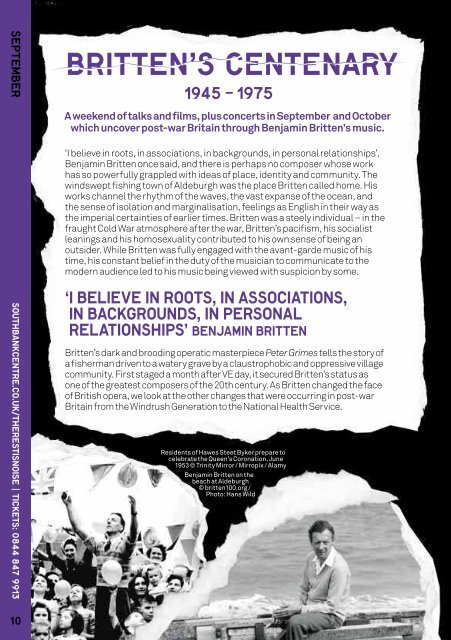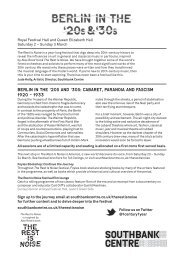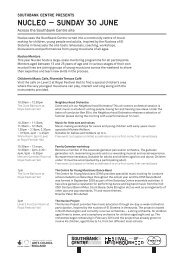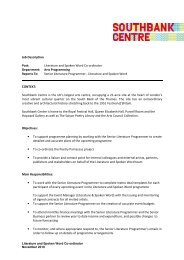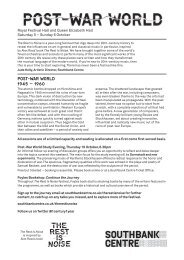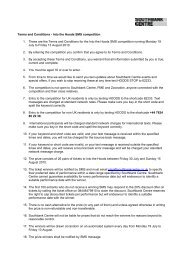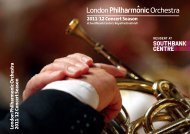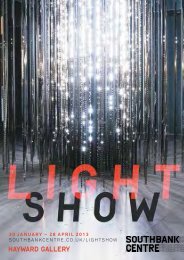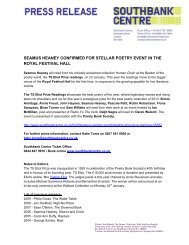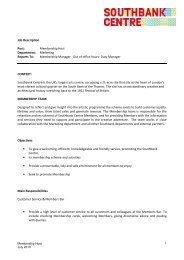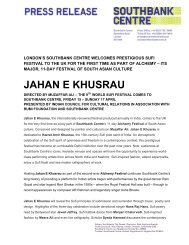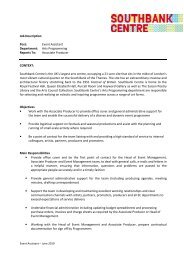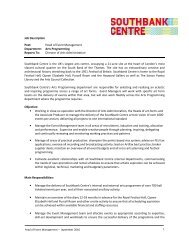continues
here - Southbank Centre
here - Southbank Centre
Create successful ePaper yourself
Turn your PDF publications into a flip-book with our unique Google optimized e-Paper software.
A Nursing Sister from Queen Charlotte’s Hospital<br />
with the latest Oxygen tent. 1948 © TopFoto<br />
SEPTEMBER southbankcentre.co.uk/therestisnoise | tickets: 0844 847 9913<br />
10<br />
1945 – 1975<br />
A weekend of talks and films, plus concerts in September and October<br />
which uncover post-war Britain through Benjamin Britten’s music.<br />
‘I believe in roots, in associations, in backgrounds, in personal relationships’,<br />
Benjamin Britten once said, and there is perhaps no composer whose work<br />
has so powerfully grappled with ideas of place, identity and community. The<br />
windswept fishing town of Aldeburgh was the place Britten called home. His<br />
works channel the rhythm of the waves, the vast expanse of the ocean, and<br />
the sense of isolation and marginalisation, feelings as English in their way as<br />
the imperial certainties of earlier times. Britten was a steely individual – in the<br />
fraught Cold War atmosphere after the war, Britten’s pacifism, his socialist<br />
leanings and his homosexuality contributed to his own sense of being an<br />
outsider. While Britten was fully engaged with the avant-garde music of his<br />
time, his constant belief in the duty of the musician to communicate to the<br />
modern audience led to his music being viewed with suspicion by some.<br />
‘I believe in roots, in associations,<br />
in backgrounds, in personal<br />
relationships’ benjamin britten<br />
Britten’s dark and brooding operatic masterpiece Peter Grimes tells the story of<br />
a fisherman driven to a watery grave by a claustrophobic and oppressive village<br />
community. First staged a month after VE day, it secured Britten’s status as<br />
one of the greatest composers of the 20th century. As Britten changed the face<br />
of British opera, we look at the other changes that were occurring in post-war<br />
Britain from the Windrush Generation to the National Health Service.<br />
Residents of Hawes Steet Byker prepare to<br />
celebrate the Queen’s Coronation, June<br />
1953 © Trinity Mirror / Mirropix / Alamy<br />
Benjamin Britten on the<br />
beach at Aldeburgh<br />
© britten100.org /<br />
Photo: Hans Wild<br />
SATURDAY 28 –<br />
SUNDAY 29 SEPTEMBER<br />
weekend events from 10am<br />
Music that moved a nation.<br />
In the fraught atmosphere of the Cold War, despite Britten’s pacifism,<br />
socialist leanings and homosexuality, he became one of the most<br />
celebrated composers of his time. However, his tonal, communicative music<br />
was viewed as suspicious by some of his avant-garde contemporaries. We look at his<br />
remarkable work in the context of post-war Britain.<br />
IN DEPTH DISCUSSIONS<br />
• Alex Ross, author of The Rest Is Noise,<br />
looks at how composers navigated the<br />
fractured cultural universe at the end of<br />
the Second World War.<br />
• Alexandra Harris, author of Romantic<br />
Moderns, discusses how George Piper<br />
and Graham Sutherland returned to<br />
landscapes after the Second World War<br />
with artist George Shaw.<br />
• Paul Kildea, author of Benjamin Britten:<br />
A Life in the Twentieth Century gives a<br />
survey of this original and complex mind.<br />
• The arrival of the SS Empire Windrush<br />
in June 1948 marked the beginning of<br />
post-war mass migration. Paul Gilroy,<br />
Lawrence Scott and Susheila Nasta<br />
discuss The Windrush Generation.<br />
BITES: YOUR WHISTLE-STOP TOUR<br />
15 minutes on some of the need-to-know<br />
topics of the era.<br />
• We look back at the life and labours<br />
of the National Health Service, now<br />
almost 60 years old.<br />
• Following the destruction of the<br />
Second World War there was a great<br />
rise in pacifism across Britain.<br />
• Imogen Holst – the overlooked but<br />
talented composer who travelled the<br />
world, helped composers exiled by fascism<br />
and was an invaluable support to Britten.<br />
• The Angry Young Men included writers John<br />
Osborne and Kingsley Amis in their ranks.<br />
But who were they angry with and why?<br />
FOR MORE DETAILS, SPEAKERS, TOPICS AND TIMINGS, GO TO<br />
SOUTHBANKCENTRE.CO.UK/THERESTISNOISE<br />
BREAKFAST WITH Britten<br />
Grab a coffee and delve inside the music<br />
of The Rest Is Noise festival. Composer<br />
John Browne leads a fun and informal<br />
workshop about Britten’s Peter Grimes.<br />
LIVE MUSIC<br />
Britten and Russia – Alexander Ivashkin<br />
and Andrew Zolinsky present a programme<br />
of Britten’s cello music inspired by the<br />
composer’s friendship with Shostakovich<br />
and Rostropovich.<br />
Noye’s Fludde – Britten’s colourful opera<br />
inspired by Noah and his ark.<br />
LISTEN TO THIS<br />
Don’t know where to start? Michael<br />
Berkeley, broadcaster, composer and<br />
Britten’s godson, brings Britten’s music<br />
to life in these beginner’s guides.<br />
FILM SCREENINGS<br />
Including our feature film<br />
Moonrise Kingdom by Wes Anderson.<br />
DAY PASs £15*<br />
WEEKEND pASS £25*<br />
*Concerts are not included in the<br />
Day or Weekend Passes<br />
BFI Southbank presents a season focused<br />
on Britten on Film and TV in September and<br />
October bfi.org.uk/britten<br />
TURN OVER FOR<br />
FULL DETAILS OF<br />
THE WEEKEND<br />
SEPTEMBER<br />
southbankcentre.co.uk/therestisnoise | tickets: 0844 847 9913<br />
11


